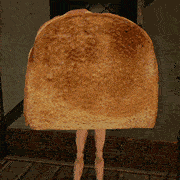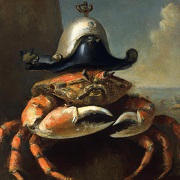|
Welcome earthlings to the Awful Book of the Month! In this thread, we choose one work of Resources: Project Gutenberg - http://www.gutenberg.org - A database of over 17000 books available online. If you can suggest books from here, that'd be the best. SparkNotes - http://www.sparknotes.com/ - A very helpful Cliffnotes-esque site, but much better, in my opinion. If you happen to come in late and need to catch-up, you can get great character/chapter/plot summaries here.  For recommendations on future material, suggestions on how to improve the club, or just a general rant, feel free to PM me. For recommendations on future material, suggestions on how to improve the club, or just a general rant, feel free to PM me.  Past Books of the Month [for BOTM before 2014, refer to archives] 2014: January: Ursula K. LeGuin - The Left Hand of Darkness February: Mikhail Bulgalov - Master & Margarita March: Richard P. Feynman -- Surely You're Joking, Mr. Feynman! April: James Joyce -- Dubliners May: Gabriel Garcia Marquez -- 100 Years of Solitude June: Howard Zinn -- A People's History of the United States July: Mary Renault -- The Last of the Wine August: Barbara Tuchtman -- The Guns of August September: Jane Austen -- Pride and Prejudice October: Roger Zelazny -- A Night in the Lonesome October November: John Gardner -- Grendel December: Christopher Moore -- The Stupidest Angel 2015: January: Italo Calvino -- Invisible Cities February: Karl Ove Knausgaard -- My Struggle: Book 1. March: Knut Hamsun -- Hunger April: Liu Cixin -- 三体 ( The Three-Body Problem) May: John Steinbeck -- Cannery Row June: Truman Capote -- In Cold Blood (Hiatus) August: Ta-Nehisi Coates -- Between the World and Me September: Wilkie Collins -- The Moonstone October:Seth Dickinson -- The Traitor Baru Cormorant November:Svetlana Alexievich -- Voices from Chernobyl December: Michael Chabon -- Gentlemen of the Road 2016: January: Three Men in a Boat (To say nothing of the Dog!) by Jerome K. Jerome February:The March Up Country (The Anabasis) of Xenophon March: The Name of the Rose by Umberto Eco April: Plain Tales from the Hills by Rudyard Kipling May: Temple of the Golden Pavilion by Yukio Mishima The Vegetarian by Han Kang Current: Lud-in-the-Mist by Hope Mirrlees Book is available as a free download here: https://www.dropbox.com/s/26sg2xsks3t9d2x/Lud-in-the-Mist%20-%20Hope%20Mirrlees.epub?dl=0 if you don't want dropbox, also here: http://www.eithin.com/texts/Lud-in-the-Mist.pdf but that's an img-based pdf and thus deprecated. (Published in 1926, it should be well out of U.S. copyright). quote:Neil Gaiman described Lud as "one of the finest [fantasy novels] in the English language.... It is a little golden miracle of a book." He described Mirrlees's writing as "elegant, supple, effective and haunting: the author demands a great deal from her readers, which she repays many times over."[6] He says that it is one of his top ten favorite books.[7] quote:Lud-in-the-Mist is an unusual fantasy first published in 1926, before The Hobbit and considerably before the existence of fantasy as a marketing genre. It would be recognised as one of the founding works of the genre except for the way it has rarely been noticed and seldom reprinted. It’s a book that is itself in the tradition of Rossetti’s Goblin Market (1862) and Dunsany’s The King of Elfland’s Daughter (1924). It’s very clearly an influence on Susannah Clarke’s Jonathan Strange and Mr. Norrell, and Neil Gaiman’s Stardust and the work of Greer Gilman, so perhaps it has contributed to a particular strand of fantasy, a particular way of approaching the numinous. http://www.tor.com/2010/10/06/next-door-to-fairyland-hope-mirrlees-lud-in-the-mist/ quote:All that meta-commentary aside, Lud is, in short, an extraordinary book. If Lord of the Rings is the big, bombastic Grandfather of modern fantasy, Lud is obviously the quiet, unassuming Grandma who showed everyone how to grow wild mint out back and jitterbug in the kitchen. In fact, given that Mirrlees published in 1926, some time before Dr. T’s opus, I would not be at all surprised if the Shire was full of Granny Hope’s patented mint.2. Look carefully at any work of fantasy in which urban worldbuilding, provincial farmlife, idyllic villages, or fanciful names figure largely, and you’ll see Mirrlees’ ghost peeping through the pages. She could even be called the mother of interstitial literature, since Lud combines the fantasy genre with horror and of all things, procedural crime drama and political philosophy. -- Catherynne M. Valente, online at http://web.archive.org/web/20060504162204/bitterquill.com/2006/01/24/fairy-fruit-now-served-at-all-the-finest-restaurants/ About the Author quote:Born in Chislehurst, Kent and raised in Scotland and South Africa, . . . . While at Cambridge, Mirrlees developed a relationship with famous classicist Jane Ellen Harrison, Mirrlees' tutor and later her close friend and collaborator. quote:Virginia Woolf, however, found her exasperating. In her diaries, she called Mirrlees "a very self conscious, wilful, prickly & perverse young woman, rather conspicuously well dressed & pretty, with a view of her own about books & style, an aristocratic & conservative tendency in opinion, & a corresponding taste for the beautiful & elaborate in literature." She invited Hope over for the weekend, and was appalled to discover that she not only changed her dress every night for dinner, but wore powder and scent in profusion and a wreath in her hair that matched the color of her stockings and every night, a different color of stockings. She was, Woolf concluded bemusedly, "rather an exquisite apparition." http://www.infinityplus.co.uk/introduces/mirrlees.htm Pacing Just read, then post. References and Further Reading This could go in a lot of directions, but there's a good website at http://hopemirrlees.com/ that gives in-depth background on Hope Mirrlees, her writing, how she fits or can be fit into the Modernist pantheon, etc. Final Note: If you have any suggestions to change, improve or assess the book club generally, please PM or email me -- i.e., keep it out of this thread -- at least until into the last five days of the month, just so we don't derail discussion of the current book with meta-discussion. I do want to hear new ideas though, seriously, so please do actually PM or email me or whatever, or if you can't do either of those things, just hold that thought till the last five days of the month before posting it in this thread. Thanks, and I hope everyone enjoys the book!
|
|
|
|
|

|
| # ? May 4, 2024 15:19 |
|
Also, please let me know if you find any typos or other mistakes in the ePub, so I can correct them. Hm, if people are actually going to read the ePub, maybe I should find somebody to do a proper non-copyrighted cover for it instead of the mock-Penguin one.
|
|
|
|
Thanks for the epub, will read.
|
|
|
|
Definitely going to read this one. Thanks for the epub version, my kindle doesn't do well with .pdf.
|
|
|
|
|
elf wizards. this is the poo poo i live for. will give it a read!!
|
|
|
|
In other news, I actually bought a copy of the CDs that appear to be the only recordings I could find of "Columbine," so now I actually know the tune. I guess I can't put them up for download so maybe I'll just record myself singing it or something if people actually want to know? (Spoiler: it's very slow and could really use a peppy chiptune rearrangement.)
|
|
|
Rand Brittain posted:In other news, I actually bought a copy of the CDs that appear to be the only recordings I could find of "Columbine," so now I actually know the tune. I guess I can't put them up for download so maybe I'll just record myself singing it or something if people actually want to know? Which version, the folk music one or the guy with the harp where the CD cost $45? The harp version sounded a lot better from he short clip I could find. Ultimately it seems like it's a basic folk tune that could fit a lot of melodies, including the traditional "over the hills and far away" melody (not the Zeppelin song). I'll post more about the folk lore background to this book a bit later. It has a deeeep pedigree; versions of the Columbine song date to the Elizabethan era. Hieronymous Alloy fucked around with this message at 19:23 on Jul 2, 2016 |
|
|
|
|
I just got my copy! It has no dust jacket, just grey cloth hardback binding. It looks appropriately arcane. Looking forward to delving into it!
|
|
|
|
this looks fun, I wish I hadn't left my kindle on the X5 bus to Caernarfon. i just ordered a used copy if you find my kindle tho hmu
|
|
|
|
|
It's not wrong when described as meandering. I'm a few chapters in and it appears to be a paean to the good old days of aristocratic rule, who despite a few misdemeanors had the poor farm people at heart. Unlike those beastly merchants. It does have a tension and macabre about it - it's pretty clear where Susanna Clark got her inspiration from. Rand Brittain posted:In other news, I actually bought a copy of the CDs that appear to be the only recordings I could find of "Columbine," so now I actually know the tune. I guess I can't put them up for download so maybe I'll just record myself singing it or something if people actually want to know? Yup, wouldn't mind hearing that.
|
|
|
|
Getting towards the end now - am I the only one reading this? The episode around the girls' school I found quite brilliant - real horror, and I had trouble sleeping. Since then there's been a bit too much plot and exposition to carry that horror. It's a hot bed reactionary thought - anti-science, anti-progress and a love of how things used to be. It's quite frightening how few females have agency.
|
|
|
|
Grabbed the epub, will probably get around to starting it in a few days.
|
|
|
knees of putty posted:Getting towards the end now - am I the only one reading this? The episode around the girls' school I found quite brilliant - real horror, and I had trouble sleeping. Since then there's been a bit too much plot and exposition to carry that horror. It's a hot bed reactionary thought - anti-science, anti-progress and a love of how things used to be. It's quite frightening how few females have agency. I think people are getting started. Some people might be holding off a bit to let others start talking.
|
|
|
|
|
I was being lazy in adding the epub to my ereader, but I've done that now and will be starting it shortly. edit - big thanks to Rand Brittain for the epub btw Enfys fucked around with this message at 11:58 on Jul 7, 2016 |
|
|
|
I'm about a third in and honestly, going by the descriptions I've seen, I somehow got the impression that this is going to be a warm, cozy book. This is not a warm, cozy book. And those fairies are assholes.
|
|
|
|
|
I'd say it's moderately cozy, but it's also moderately horrifying. There's a reason why people tend to describe it as having a little bit of everything. I'm not sure if I'd describe it as reactionary, though, although it does have a lot of upper-class characters who are pretty smugly superior. (At the same time, it's not afraid to say that they've become kind of bad at governing because they no longer have any idea what the working class thinks about anything.)
|
|
|
|
The class/progress conflict is kind of interesting. I'm about halfway through and I'd expect I'd be able to figure out whose side the author is on by now - but you get the silly, stuck-up, pompous city merchants against downright creepy fairies well-loved by the rural and working folk. Makes one interested of whether anyone ever analyzed this book from a properly rabid Marxist perspective. On a side note, one phrase that's really stuck with me from was from when Ranulph is traveling to the farm, don't have my Kindle here now but it goes something like "Nothing at all happened during the journey (...) except for the endless pleasant things of country in summer." I think that sums up the idea I'm getting from the book rather well: the real issue of Lud-in-the-mist's inhabitants seems to be taking things for granted.
|
|
|
|
|
It's interesting that y'all are focusing on the class divide because on my most recent read through I barely thought about that at all and focused instead on the gender/sexuality/"corruption" angle. Things getting dirty at an all-girls school! I agree that a "rabid" Marxist analysis would be interesting. Have to wonder what China Mieville's would make of it.
|
|
|
|
|
Finished now. It was OK, but disappointed that it diverted from the macabre set up it initially had. The class angle didn't seem to persist or at least it gets confused - it just got lost in a kind of detective story in which we already knew who the guilty were. There is a division in the book, but it's actually hard to unpick. The theme does seem to be reason vs. faith / enlightenment vs. romanticism, but it's rather more vague than that. Mirrlees doesn't ever allow much focus on the more interesting aspects. For example, Nat throws himself into the abyss in blind faith and then the people let faith back into their life ... that's about all she's willing to say.
|
|
|
|
I think it's less about faith and more about... not even really spirituality, more about rhyme-versus-reason and the need to accept the irrational parts of life if you want to be able to remain rational. The idea of a sexuality angle to the whole thing hadn't really occurred to me at all.
|
|
|
Rand Brittain posted:The idea of a sexuality angle to the whole thing hadn't really occurred to me at all. By the way, am I right assuming the Dionysus of this story is Leer? Because he's first introduced as compassionate and caring and then proceeds to act in the completely opposite way... Rather like Dionysus being the god of wine and revelry and turning out to be a cold-blooded plotter. Hieronymous Alloy posted:I agree that a "rabid" Marxist analysis would be interesting. Have to wonder what China Mieville's would make of it. anilEhilated fucked around with this message at 20:46 on Jul 8, 2016 |
|
|
|
|
anilEhilated posted:By the way, am I right assuming the Dionysus of this story is Leer? Because he's first introduced as compassionate and caring and then proceeds to act in the completely opposite way... Rather like Dionysus being the god of wine and revelry and turning out to be a cold-blooded plotter. I tend to assume that he's both; he's a schemer and he did some murders to get to his present influential position, but his goals are noble for some value of noble and he isn't lying when he says he "can't help being a physician and giving balm." He's a high-minded revolutionary who's signed onto the Aubrey platform for rational reasons, but has about as few scruples as Duke Aubrey does himself.
|
|
|
Rand Brittain posted:I think it's less about faith and more about... not even really spirituality, more about rhyme-versus-reason and the need to accept the irrational parts of life if you want to be able to remain rational. I think there's some strong support for it given 1) Rosetti's Goblin Market, 2) the whole Victorian-era sexual repression thing, and 3) Mirrlees' probable homosexuality. And then the son gets corrupted by the stablehand, etc. Saying "fairies = gays" is waaay reductionist though; there's a lot more going on here than just that.
|
|
|
|
Anyway, a little background on "Chanticleer". Name comes from a cycle of French folk tales.quote:
https://en.wikipedia.org/wiki/The_Nun%27s_Priest%27s_Tale
|
|
|
|
|
Hieronymous Alloy posted:I think there's some strong support for it given 1) Rosetti's Goblin Market, 2) the whole Victorian-era sexual repression thing, and 3) Mirrlees' probable homosexuality. And then the son gets corrupted by the stablehand, etc. Saying "fairies = gays" is waaay reductionist though; there's a lot more going on here than just that. Yeah, I'd say that was a stretch, given that Ranulph's encounter with Willy Wisp seems way more like "young nerd teased by older boy" than "homosexual encounter" but really, who knows with Victorians? It's less of a stretch with the young girls, of course.
|
|
|
|
Welp, I certainly didn't expect it turning into a detective story. This book really was ahead of its time.
|
|
|
|
|
knees of putty posted:Yup, wouldn't mind hearing that. Sadly, the low note in "strawberry-wire" is really killing me here.
|
|
|
|
A fine book supporting decriminalization and harm-reduction, as opposed to the current, deeply flawed U.S. drug policy. The harm of the addictive and personally destructive fairy fruits being paltry compared to the evils worked out by the criminal distribution network (the over-zealous anti-drug enforcement units also playing their part to alienate and separate society). The narrative of gradual encirclement of the Leer distribution network, and the pursuit of the case at the expense of friends, family, and self promotion, combined with the permeation of the fairy fruit "game" in the entire socio-political milieu of society, mirrors beat for beat the first season of David Simon's The Wire.
|
|
|
|
Tree Goat posted:A fine book supporting decriminalization and harm-reduction, as opposed to the current, deeply flawed U.S. drug policy. The harm of the addictive and personally destructive fairy fruits being paltry compared to the evils worked out by the criminal distribution network (the over-zealous anti-drug enforcement units also playing their part to alienate and separate society). The narrative of gradual encirclement of the Leer distribution network, and the pursuit of the case at the expense of friends, family, and self promotion, combined with the permeation of the fairy fruit "game" in the entire socio-political milieu of society, mirrors beat for beat the first season of David Simon's The Wire. ...yeah, okay, I can actually see that, which is pretty impressive.
|
|
|
Tree Goat posted:A fine book supporting decriminalization and harm-reduction, as opposed to the current, deeply flawed U.S. drug policy. The harm of the addictive and personally destructive fairy fruits being paltry compared to the evils worked out by the criminal distribution network (the over-zealous anti-drug enforcement units also playing their part to alienate and separate society). The narrative of gradual encirclement of the Leer distribution network, and the pursuit of the case at the expense of friends, family, and self promotion, combined with the permeation of the fairy fruit "game" in the entire socio-political milieu of society, mirrors beat for beat the first season of David Simon's The Wire. Minor point though: written in Britain in 1926, so not a commentary on modern U.S. drug policy. However, the Rollestone Act was passed in Britain that same year: quote:Before the 1920s, regulation in Britain was controlled by the pharmacists. Pharmacists that were found to have prescribed opium for illegitimate causes and anyone found to have sold opium without proper qualifications would be prosecuted.[91] Due to the passing of the Rolleston Act in Britain in 1926, doctors could prescribe opiates such as morphine and heroin on their own accord based on if they felt their patients demonstrated a medical need. https://en.wikipedia.org/wiki/Opium#Regulation_in_Britain_and_the_United_States And of course Prohibition would have begun in America six years previously.
|
|
|
|
|
Hieronymous Alloy posted:Minor point though: written in Britain in 1926, so not a commentary on modern U.S. drug policy. drat, really? I bet he didn't think of that.
|
|
|
|
A human heart posted:drat, really? I bet he didn't think of that. It's possible that not everybody is familiar with Cinema Discusso-style book reviews.
|
|
|
|
I finished this today on the train, and I'm in two minds about it. On the one hand, it's beautiful and important and has some really great scenes, and the climax was ace. Copy-pasting my thoughts from GoodReads: I wish I loved this more than I do. It's a classic piece of fantasy storytelling, and Mirrless builds a really rich little world. It's populated largely with stock characters, but the culture they inhabit is detailed enough that for the most part they're endearing enough. The worldbuilding does require enough attention and care that the story takes a l-o-n-g time to build momentum, which I found offputting for the first half of the book honestly. The rambling style of many scenes does mean the tension didn't hold for me. Once things pick up though, there are some really great scenes - at one point it turns into a kind of detective romp. You could even say that the plot concerns a small city truggling with an influx of narcotics. The climax was super, and the ending was a pleasant surprise that put a smile on my face. It's also interesting to read this sort of fantasy storytelling from a world pre-Tolkien and pre-Lewis. Nothing's been codified, and so Mirrlees sometimes writes with the air of a historian, including comparisons to "our" world peppered throughout the text. It's easy to see why this is considered a classic piece of literature, let alone fantasy. The fact that we don't get to see pretty much anything of Fairyland was both disappointing and made complete sense given the flow of the narrative. I hadn't considered its place in the context of drug/alcohol prohibition, but the ending is a nice counterpoint to the stuffy, paternalistic class dynamics of the rest of the book.
|
|
|
|
About halfway through this and it is much better than expected. It reminds me of Jonathan Strange & Mr Norrell which I guess is an obvious thing because of the fairies but even more specifically how creepy they are and the nightmare scenario of them basically driving a bunch of people out of their minds on what seems like a total whim.
|
|
|
|
One thing I kinda wonder about is whether it's trying to make a connection between fantasy and death. Throughout the book it's mentioned that the dead go to Fairyland and then you have Duke Audrey living it up there - sure, it's a point as old as Gilgamesh but it gives the whole book a distinctly morbid tone: even the fairy fruit coming down the river that flows from afterlife evokes distinctly mythological connotations - and Nathanael has to at least symbolically die in order to fit into Fairyland. Is what everyone in Lud wants really just a drop from Lethe? Is there a point to be made about indulging in fantasies being ultimately destructive?
|
|
|
|
|
anilEhilated posted:Is there a point to be made about indulging in fantasies being ultimately destructive? That seems backwards, given that the moral seems to be that you have to indulge your fantasy to remain mentally healthy. Although, I guess that doesn't mean it isn't associated with death, since you could also phrase it as "it isn't healthy to never do unhealthy things." Rand Brittain fucked around with this message at 17:39 on Jul 14, 2016 |
|
|
|
Rand Brittain posted:That seems backwards, given that the moral seems to be that you have to indulge your fantasy to remain mentally healthy. Actually, this is kind of a hackneyed description. I think a better way to get at what the novel is trying to say is to apply Hempie's speech about how she wouldn't have chosen the fairies as neighbors to the contents of your own mind.
|
|
|
|
Rand Brittain posted:That seems backwards, given that the moral seems to be that you have to indulge your fantasy to remain mentally healthy. I think the fairy lands especially are synonymous with death, and the "Silent Folk" in general are described more like spirits roaming the earth. If there is any death analogy I would say it has to do with coming to terms with your own mortality maybe? Fairy stuff is considered highly taboo and the message seems to be that it is not necessarily evil or good but just a natural part of life that you have to accept. Finished this today, really liked the ending but don't really have anything more insightful to say about it at the moment.
|
|
|
|
Guy A. Person posted:I think the fairy lands especially are synonymous with death, and the "Silent Folk" in general are described more like spirits roaming the earth. If there is any death analogy I would say it has to do with coming to terms with your own mortality maybe? Fairy stuff is considered highly taboo and the message seems to be that it is not necessarily evil or good but just a natural part of life that you have to accept. Hm, looking over it again, that's actually really interesting. I was lumping in the fear of death element with a larger "irrationality" element, but truthfully, the book is quite insistent in claiming that the fear of death is the root of everything that Fairyland represents.
|
|
|
|

|
| # ? May 4, 2024 15:19 |
|
Need nominations for next month! Right now I'm leaning noir but that's just because I'm re-reading Chandler anyway.
|
|
|
|


















